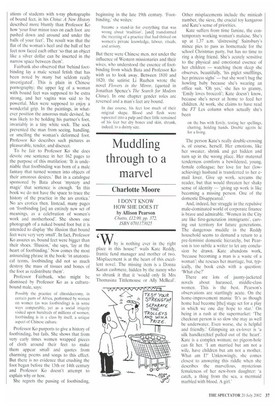Muddling through to a marvel
Charlotte Moore
I DON'T KNOW HOW SHE DOES IT by Allison Pearson
Chatto, £12.99, pp. 372 ISBN 0701173025
Why is nothing ever in the right place in this house?' wails Kate Reddy, frantic fund manager and mother of two. Misplacement is at the heart of this excellent novel. The missing item is a Donna Karan cashmere, hidden by the nanny who so shrunk it that it 'would only fit Mrs Thomasina Tittlemouse or Ally McBeal'.
Other misplacements include the minicab number, the sieve, the crucial toy kangaroo and Kate's sense of priorities.
Kate suffers from time famine, the contemporary working woman's malaise. She's up at 1.37 a.m. 'distressing' Sainsbury's mince pies to pass as homemade for the school Christmas party, but has no time to ring a dying friend. She's acutely sensitive to the physical and emotional essence of her children — watching them sleep she observes, beautifully, 'his piglet snufflings, her princess sighs' — but she won't hug the howling baby because she's wearing an office suit. 'Oh yes,' she lies to granny, 'Emily loves broccoli'; Kate doesn't know, because she's never at home to feed her children. At work, she claims to have read the FT Lex column when actually she's been
on the bus with Emily, testing her spellings, chatting, holding hands. Double agents lie for a living.
The person Kate's really double-crossing is, of course, herself. Her emotions, like her sweater, shrink and get hidden and turn up in the wrong place. Her maternal tenderness comforts a bewildered, young, female colleague; her love for her (lowachieving) husband is transferred to her email lover. Give up work, screams the reader, but that would threaten her shaky sense of identity — 'giving up work is like becoming a missing person. One of the domestic Disappeared.'
And, indeed, her struggle in the repulsive male-dominated world of corporate finance is brave and admirable. 'Women in the City are like first-generation immigrants', carving out territory for future generations. The dangerous muddle in the Reddy household seems to demand a return to a pre-feminist domestic hierarchy, but Pearson is too subtle a writer to let any conclusion be drawn. Kate abandons work, 'because becoming a man is a waste of a woman': she rescues her marriage, but, typically, the book ends with a question: 'What else?'
There are lots of jaunty-jacketed novels about harassed, middle-class women. This is the best. Pearson's observations are startlingly acute. On the home-improvement mania: 'It's as though home had become [the] stage set for a play in which we one day hope to star.' On being in a rush at the supermarket: 'The checkout person is so slow she may as well be underwater. Even worse, she is helpful and friendly.' Glimpsing an ex-lover is 'a silk handkerchief pulled out of the heart'. Kate is a complex woman; no pigeon-hole can fit her. 'I am married but am not a wife, have children but am not a mother. What am I?' Unknowingly, she comes closest to answering this riddle when she describes the marvellous, mysterious femaleness of her new-born daughter: 'a catch, a thing from the sea, a mermaid marbled with blood. A girl.'


























































 Previous page
Previous page